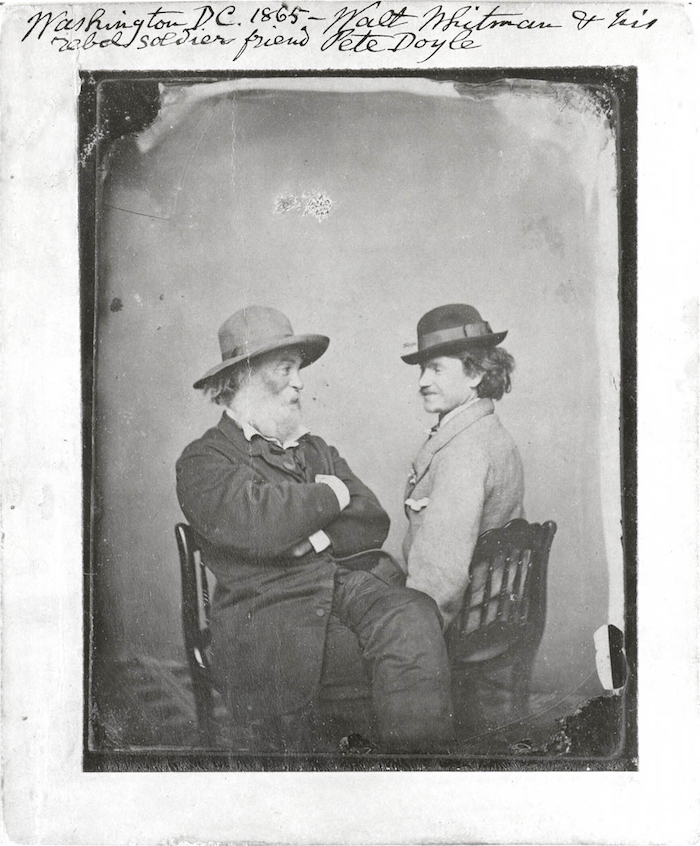In the rush to pay tribute to President Lincoln on the 150th anniversary of his death this month much has been said of his greatness – and of John Wilkes Booth’s villainy. But I found no mention of the young man who watched from the second gallery of Ford’s Theatre on April 14, 1865, and whose memories have helped shape our understanding of that night.
Peter Doyle, 21, had served almost two years in the Confederate Army. Wounded at Antietam, he was discharged after arguing successfully that, as an Irish immigrant, he held loyalties to neither South nor North. He settled in Washington, DC, and found work as a conductor on the horsecars that ran along Pennsylvania Avenue. It was while working the night shift that he met poet Walt Whitman.
Doyle remembered, “He was the only passenger, it was a lonely night, so I thought I would go in and talk with him. Something in me made me do it and something in him drew me that way. He used to say there was something in me had the same effect on him . . . We were familiar at once—I put my hand on his knee—we understood.”

Whitman was working as a clerk at the Department of the Interior but his real purpose in Washington was to volunteer as a nurse among the endless rows of wounded men who filled the halls that now house the American Museum of Art. Fascinated by Lincoln, the poet would stand at the corner of 14th and L Streets, NW, waiting for him to pass on his way to his summer cottage. But Whitman was in Brooklyn visiting his mother on the night the Lincolns made their way to Ford’s Theatre.
Doyle recalled that his place in the second gallery provided “a good position to see the President’s box,” which means he was on the left side of the theatre, in an area no longer open to the public. Gaining access to the spot recently, I found that Doyle would have been looking down at Lincoln, with a perfect view of the upholstered chair angled toward the stage, its back to the door.
“I heard the pistol shot,” Doyle said. “I had no idea what it was, what it meant—it was sort of muffled. I really knew nothing of what had occurred until Mrs. Lincoln leaned out of the box and cried, ‘The President is shot!’” While the rest of the crowd rushed for the exits, Doyle watched from above. “I suppose I lingered almost the last person,” he said. “A soldier came into the gallery, saw me still there, called to me: “Get out of here!”
He shared his tale with Whitman who would retell it in lectures almost a decade later, and publish it in Memoranda During the War. Whitman, with his poet’s touch, writes of a silent pause after the shot rang out, “a moment’s strange, incredulous suspense—and then deluge!—then that mixture of horror, noises, uncertainty.”
Safe in Brooklyn, Whitman experienced only the shock of grief. “The day of the murder we heard the news very early in the morning,” he writes. “Mother prepared breakfast—and other meals afterward—as usual; but not a mouthful was eaten all day by either of us. We each drank half a cup of coffee; that was all. Little was said.”
Walking the streets of Washington this spring, it’s interesting to think of the two men riding the horsecars, and sharing a dram at the Union Hotel in Georgetown at the end of the day. Doyle remembers, “Like as not I would go to sleep—lay my head on my hands on the table. Walt would sit there, wait, watch, keep me undisturbed—would wake me up when the hour of closing came.”
Most poignant is to imagine the two men together when Whitman first heard Doyle’s tale of that night at Ford’s Theatre. From that moment emerges the brilliance of Whitman’s masterpiece “When Lilac’s Bloom’d,” and the dramatic tale that would remind audiences and readers of all that was lost on the night of April 14, 1865.
Top image: Currier and Ives depiction of Lincoln’s assassination. L-to-r: Maj. Rathbone, Clara Harris, Mary Todd Lincoln, Pres. Lincoln, and John Wilkes Booth
